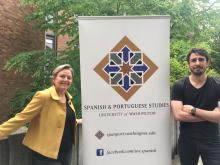Spanish & Portuguese Studies is pleased to announce that Katherine M. King and Juan Felipe Arroyave completed their dissertations and doctoral defenses, and each received their PhD in Hispanic Studies in the Spring of 2019. “As the first two graduates for our new doctoral program, their accomplishments mark a significant milestone in the development of the department’s graduate program,” said Donald Gilbert-Santamaría, Associate Professor and department Chair.
Arroyave’s dissertation, titled De las montañas al corazón de las montañas, focused on nature painting in Colombia. King’s dissertation, titled Translation 3.0: A Blueprint for Translation Studies in the Digital Age is a three-part dissertation analyzing information regarding scholarly work on contemporary Spanish translation, Google Translate, and university translation studies programs.
On completing his doctorate, Arroyave looked on his accomplishment with pride: “I'm proud. I also feel thankful for all the help I received over the past four years from the department, my classmates and my family.” King expressed a similar sentiment: “I’m thrilled. It was hugely challenging and I’m proud to have met the challenge.” She was also complimentary with regard to the diversity of their experience: “I joined an amazing cohort of fellow grad students when I started the program five years ago. I’ve learned so much from their diverse interests and experiences which made seminar discussions and debates fascinating and eye-opening.”
King cited her relationship with University faculty as being critical to their success. She referenced the assistance of her thesis advisor: “my thesis advisor Professor Tony Geist is himself an accomplished literary translator and translation scholar. I’m very lucky to have had his enthusiastic support, guidance and insights throughout this process.” She further cited help she received outside the department: “Kathleen Woodward, director of the Simpson Center for the Humanities has followed and supported my research efforts and I’m honored to have received a Simpson Center grant in 2018-19 for my Multidisciplinary Translation Studies Graduate Research Cluster.”
Arroyave also credited his relationship with department faculty: “I made it a habit to meet twice a week with Professor Edgar O'Hara, my thesis advisor, and talk about anything but my project…I ended up learning a lot about art, movies or books that had never come up in my classes, and, above all, about academia.” He further cited his relationship with other faculty: “I also appreciated how approachable Professors Donald Gilbert-Santamaría and Lauro Flores were as Departmental Chairs during my PhD, and how they were always willing to spare some time to discuss their views on the future of the humanities with me…. Another helping hand was Professor Francisco Robles, who advised me on the second chapter of my dissertation and directed me to a lot of relevant bibliography and scholarly resources.”
King and Arroyave have advice for future PhD candidates, suggesting that character is an important element to success. King refers to passion as being a key to success: “My advice for future candidates is to follow their passions. It is possible in the Department of Spanish & Portuguese to create a research project that is meaningful and important to you” said King. Arroyave emphasized the importance of determination: “start working on your dissertation as soon as you have the faintest idea on what it's going to be about…. Graduate school in general favors disciplined people…success ultimately depends on the amount of time you are willing to devote to your studies.”
Both recipients have plans in the immediate future. King looks to return to the east coast and resume her work in translation. Arroyave has received a fellowship to continue his studies at the Inter-University Center for Japanese Language Studies in Yokohama, Japan, which is “a logical extension of his research to date on the influence of Japanese culture in Colombia and elsewhere in Latin America,” said Gilbert-Santamaría.
By Casey Colvin
